GAPC calls for a national and global push for stronger alcohol policies
“No responsible government can ignore the dramatic consequences that alcohol use has for the health and wellbeing of its people. It is a primary task for governments to protect the health of their citizens.” With this strong opening statement Scotland’s First Minister Nicola Sturgeon set the tone for the rest of the Global Alcohol Policy Conference (GAPC) in Edinburgh last week. The First Minister in particular supported the idea of Minimum Unit Pricing on alcohol, a very hot political topic in Scotland right now.
More than 50 countries from all continents were represented at this year’s GAPC. In total 412 participants came to Edinburgh to work together under the conference title “Momentum for Change: research and advocacy reducing alcohol harm”. The programme contained 110 oral presentations and 55 poster presentations. Co-hosts were The Global Alcohol Policy Alliance (GAPA) and Alcohol Focus Scotland. The conference was supported by the Scottish government co-sponsored by the World Health Organizations (WHO). FORUT and IOGT International were among the eleven supporting organisations.
The opening speech by First Minister Nicola Sturgeon can be seen and heard in this video clip.
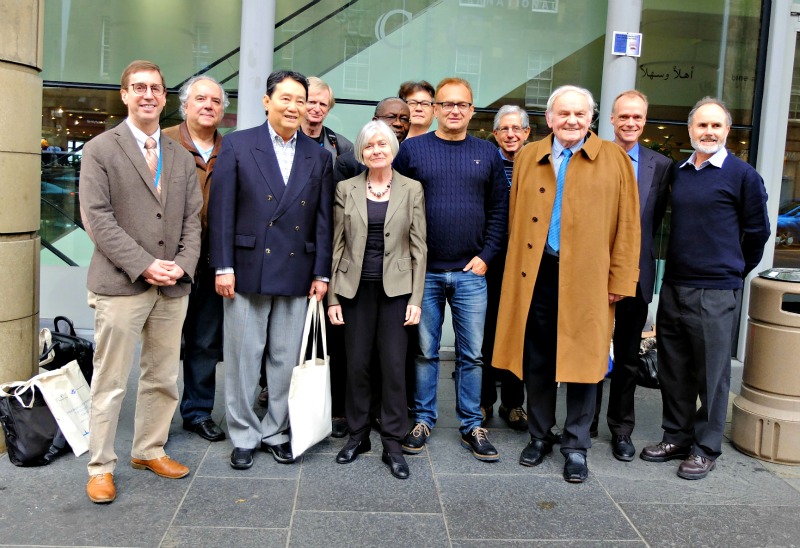 |
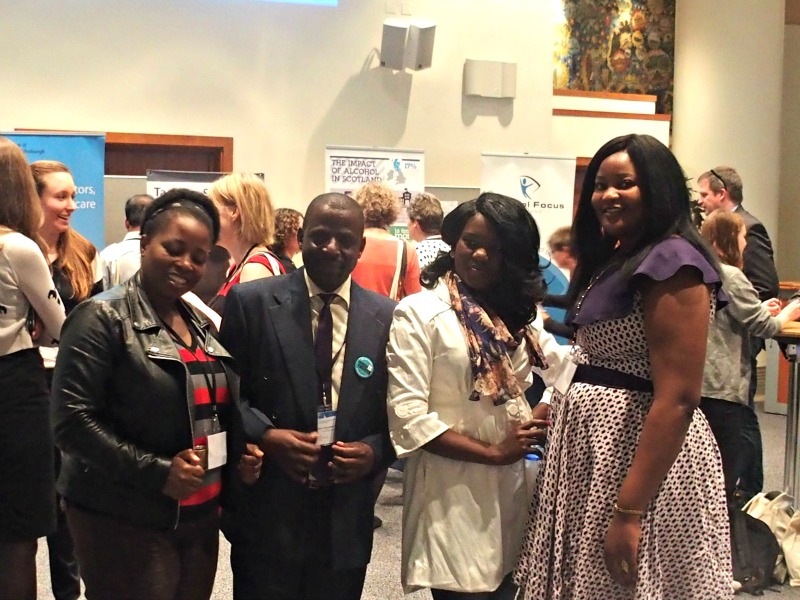 |
| The Board of the Global Alcohol Policy Alliance (GAPA) | Malawi's delegates at the GAPC in Edinburgh |
In the closing session the audience unanimously adopted the Conference Declaration which calls on governments and civil society around the world to support and implement WHO’s global strategies on alcohol and on non-communicable diseases, focusing on the most effective and cost-effective actions. This includes the three “best buys” – increasing the price of alcohol, reducing its physical availability, and restricting its marketing – as well as effective implementation and enforcement of proven strategies for reducing drink-driving.
The declaration can be viewed and downloaded here.
In her closing address to the conference the newly elected GAPA chair, Professor Sally Casswell, appealed to all participants to advocate towards national governments for stronger alcohol policies. She also pointed to the need for some kind of international, binding, health-oriented agreement to support national efforts. This can only be achieved with a strong push from the member states of WHO. In his introduction of the proposed Conference Declaration Professor David Jernigan supported this approach by saying: “The epidemiologists have documented the world. Our job is to change it”.
Scotland proved to be a well-chosen venue for a global alcohol policy conference. One thing is that all aspects of the conference were excellently taken care of by the local hosts. Equally important was that Scotland these days is an interesting and important battle ground for alcohol policy. The conflict between public health and company profits in Scotland is pronounced and was well documented by local speakers in the conference. A long series of speakers from other regions of the world showed that this is a global feature in alcohol policies these days.
In her opening speech Scotland’s First Minister Nicola Sturgeon made reference to the high figures of alcohol consumption and alcohol harm in Scotland compared to neighbouring countries. She also pointed to the fact that alcohol consumption is more harmful to the less privileged parts of the Scottish population. “Scotland’s relations to alcohol have to be changed”, First Minister Sturgeon concluded. “This is a task for all citizens, but the Government has to take a leading role”.
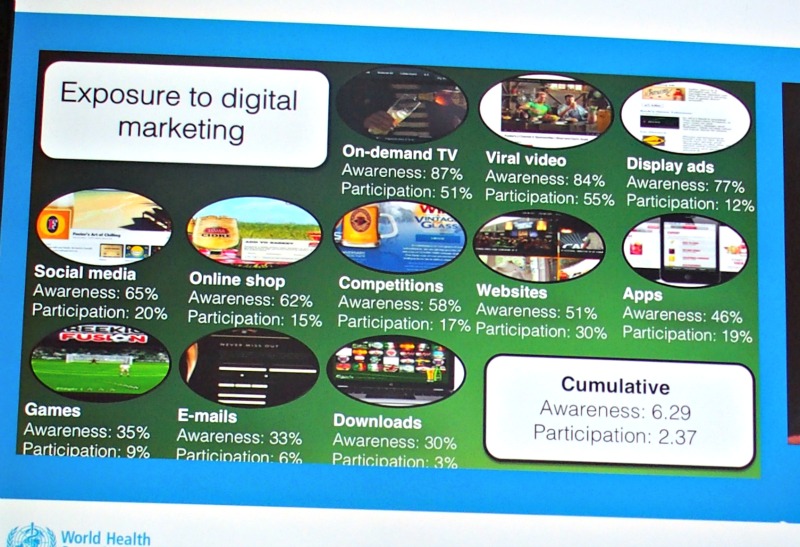 |
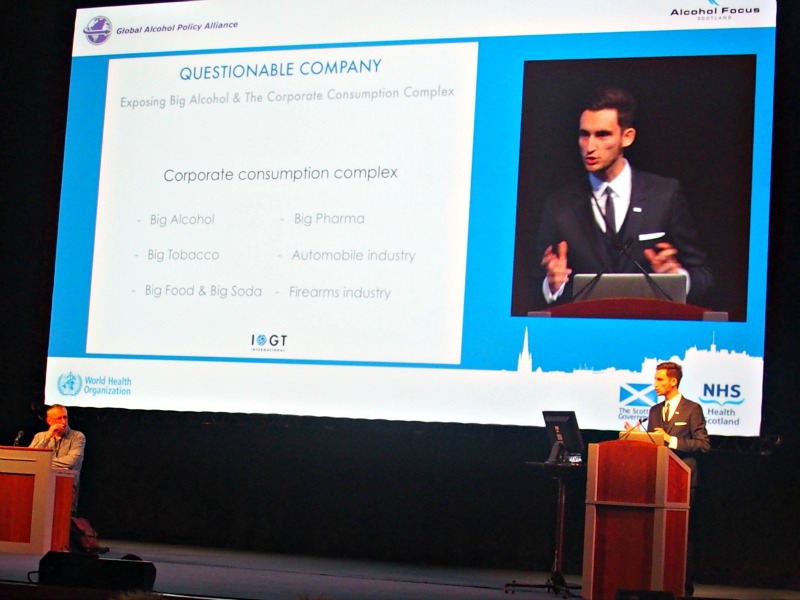 |
| Digital marketing of alcohol was presented and discussed in several of the GAPC sessions. | Maik Dünnbier from IOGT International speaking about the Corporate Consumption Complex which also includes multinational alcohol corpoations. |
The Scottish government has responded by adopting a new alcohol framework policy with a number of new interventions to reduce alcohol consumption. Next in the pipeline is to introduce a Minimum Unit Price in order to reduce the sale of very cheap booze in large containers. “There was public resistance in the beginning”, the First Minister said. “This has now changed, and the Scottish government is absolutely committed to introduce such a policy”.
The many presentations and discussions at the GAPC in Scotland well reflected the many aspects of alcohol policy discussions around the world, for example:
- Digital and social marketing is increasingly being used to reach young people with alcohol promotions, including through the increasing amount of user-produced alcohol promotions on the web, i.e. informal productions like films, songs, pictures etc. made by young drinkers themselves and shared with friends.
- The ongoing negotiations over new regional trade and investment treaties may result in international agreements that will become a threat to national alcohol policy regulations in the years to come.
- The aggressive behaviour by multinational alcohol corporations and their national branches, not the least in the emerging economies in the global South.
- The linkages between alcohol issues and other development concerns; non-communicable diseases, the new Sustainable Development Goals, child rights, gender equality etc.
The Founding Chair of GAPA, Derek Rutherford, retired from the chairmanship at the conference. In the closing session of GAPC he was warmly thanked by many speakers for his devotion to GAPA and to alcohol policy developments over several decades.
Here you can view and download Derek Rutherford's autobiography.
The next GAPC will take place in Australia in September/October 2015 with Foundation for Alcohol Research and Education (FARE) and the Public Health Association of Australia (PHAA) as the local organizers.
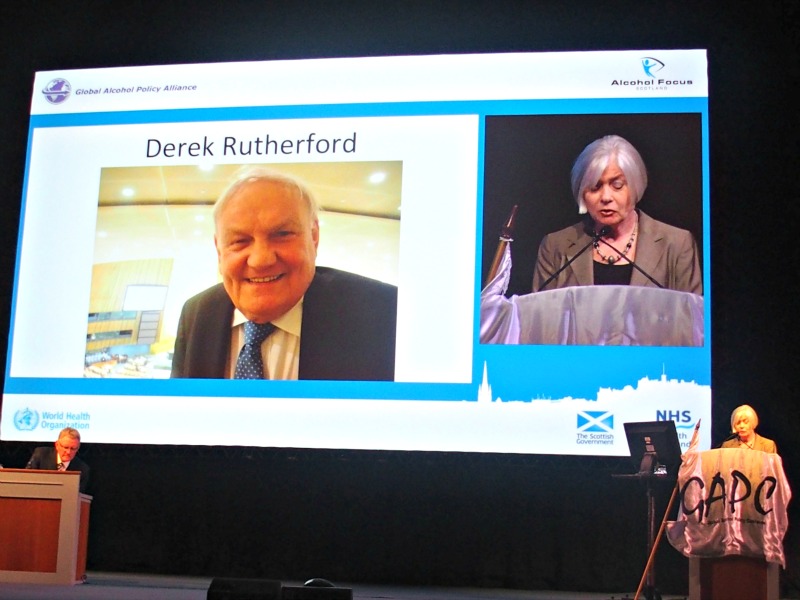 |
 |
| The new GAPA chair Sally Casswell thanked the organisation's Founding Chair Derek Rutherford for his lifetime achievements in the field of alcohol policies. | Michael Thorn received the GAPC flag on behalf of the organizers of the next GAPC to take place in Australia in 2017. |
RELATED ARTICLES
- New report highlights benefits of policy measures to prevent harmful alcohol consumption
- Spirits industry afraid of their own ingredients?
- Alcohol use - a barrier to health and to the achievement of the SDGs
- Government investments in alcohol industry up against the wall
- Abstracts for GAPC 2020 – deadline 29 July 2019
- A regional African alcohol coordination mechanism is needed
- New book reveals a series of unethical business practices by Heineken in Africa
- Next GAPC to be held in Dublin in March 2020
- SAFER – a new WHO initiative to boost national alcohol policy processes
- Trouble Brewing

